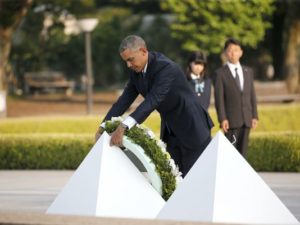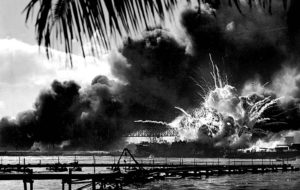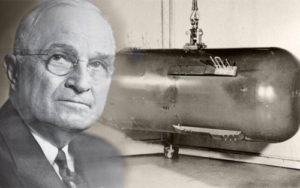 President Obama was in Japan a few days ago, where he laid a wreath at Hiroshima, the site of the dropping of the first atomic bomb. Many were concerned he would turn this event into another apology for America. That was a valid fear since he seems to consider his own country to be responsible for most of the evils of the modern era.
President Obama was in Japan a few days ago, where he laid a wreath at Hiroshima, the site of the dropping of the first atomic bomb. Many were concerned he would turn this event into another apology for America. That was a valid fear since he seems to consider his own country to be responsible for most of the evils of the modern era.
I’ve read through his speech at Hiroshima. There is no apology per se, but the language does suggest an unwillingness to differentiate between aggressor and victim in how American involvement in WWII began. He mentioned how wars are caused by a “base instinct for domination or conquest,” yet pointedly never identified who was seeking domination and conquest at the time. His words leave it open to the possibility that America was just as guilty.
Let’s be clear: there is no moral equivalence historically with respect to the combatants in WWII. Too many Americans in our current generation suffer from severe historical ignorance.
Japan, in the years leading up to the war, was ruled by a military with a fascist worldview, which included a sense of ethnic superiority—all other peoples were inferior to the Japanese. Lacking certain natural resources, that ideology led them to invade and conquer the peoples around them and take over the resources they wanted.
 It also led to 7 December 1941, the attack on Pearl Harbor that sought to take America out of the equation, thereby clearing Japan’s path of domination and conquest.
It also led to 7 December 1941, the attack on Pearl Harbor that sought to take America out of the equation, thereby clearing Japan’s path of domination and conquest.
That attack killed nearly 3,000 Americans and is what drew our nation into this world war. What followed was an unbroken series of atrocities at the hands of the Japanese military: Bataan Death March and prison camps that rivaled anything Hitler concocted.
That’s another key point: Japan was in alliance with Nazi Germany and Fascist Italy. As soon as America declared war on Japan (although Pearl Harbor made it clear who declared war first), Hitler declared war on America in solidarity with his Asian ally.
Once America and her allies began to push the Japanese out of their occupied areas, the Japanese government pledged to fight to the last man against any invasion force. Allied military analysts predicted extremely high casualties not only for their own troops, but for the Japanese as well.
The Manhattan Project was the secret development of the atomic bomb. It was begun only because Hitler was working on getting the weapon also. A world in which Hitler had an atomic bomb and no one else did, would have been a world living in constant fear of what a madman would do with it.
 President Truman, after the surrender of Germany, received word at the Postdam Conference in July 1945 that the bomb had been tested successfully. Was he now going to use it?
President Truman, after the surrender of Germany, received word at the Postdam Conference in July 1945 that the bomb had been tested successfully. Was he now going to use it?
Here’s where our historical ignorance enters in again. It has become fashionable to blame America for using this terrible weapon. Yet if you had been the president at that time, here is what you would have considered, and it’s what Truman considered: dropping one bomb might end the entire war without any further casualties for American troops.
Given the choice between an invasion that would have resulted in more American deaths and an even higher number of Japanese deaths, or the dropping of one bomb that would be devastating enough to bring the Japanese to stop fighting, Truman made the choice that was actually more humane.
In an attempt to minimize the deaths of Japanese civilians, leaflets were dropped over Hiroshima telling the people that devastation was coming; they were urged to leave.
After the bomb decimated Hiroshima, did the Japanese military realize they needed to end the war? Hardly. They pressed their scientists to come up with the same weapon. That led to the dropping of a second bomb, this time on Nagasaki.
The saddest part of this episode to me is that Nagasaki wasn’t the first choice of a target and became the target only because of the weather. Nagasaki was the most Christian city in Japan and was most resistant to the government’s policies. Such are the cruel ironies of war.
Even after the Nagasaki bombing, the military refused to surrender. The only authority in Japan that could overrule the military, the emperor, finally decided to do so. He addressed the Japanese people on the radio, informing them that the war was over. The military tried to stop the broadcast, but was unsuccessful. Many of the top military leaders then committed suicide.
These facts are either ignored or glossed over today. There is this great desire to paint America as the heartless combatant. Yet that is far from the truth.
Here is an excellent video—only 5 minutes and with interesting graphics, so you ought to invest those 5 minutes in watching it—that provides a fine overview of the Hiroshima decision. The speaker is Father Wilson Miscamble, a professor of history at the University of Notre Dame. After viewing it, in conjunction with what I’ve written here, I hope you will have a clearer understanding of what took place and why.
Ignorance of history can be corrected. What’s harder to correct is an ideology that seeks to remain ignorant.
